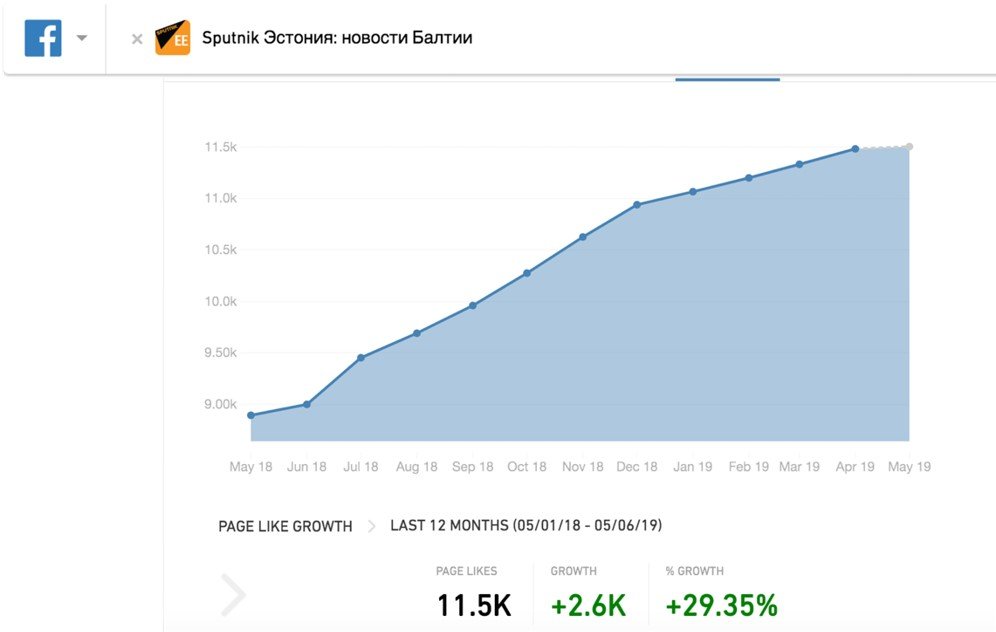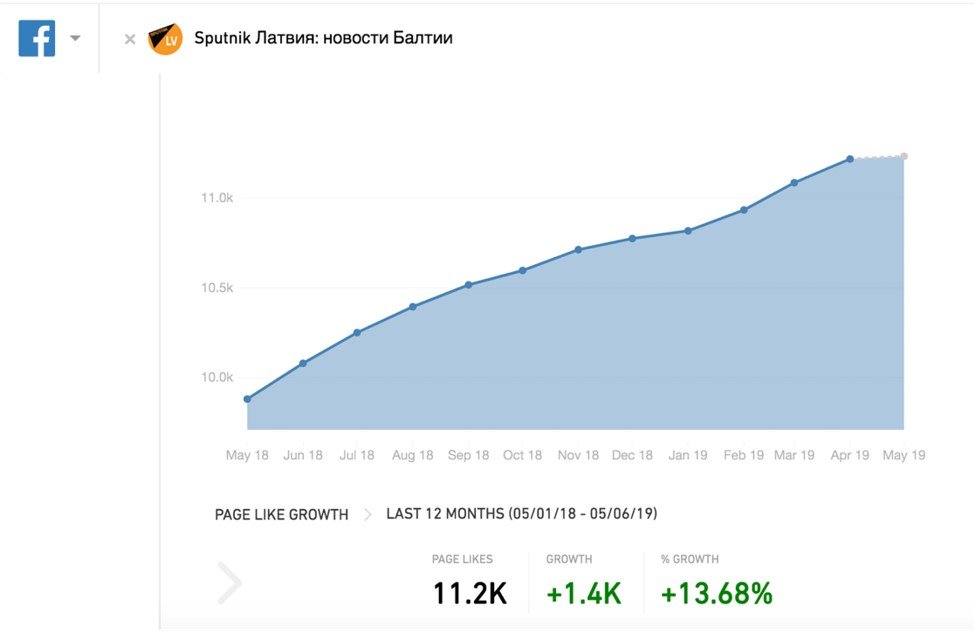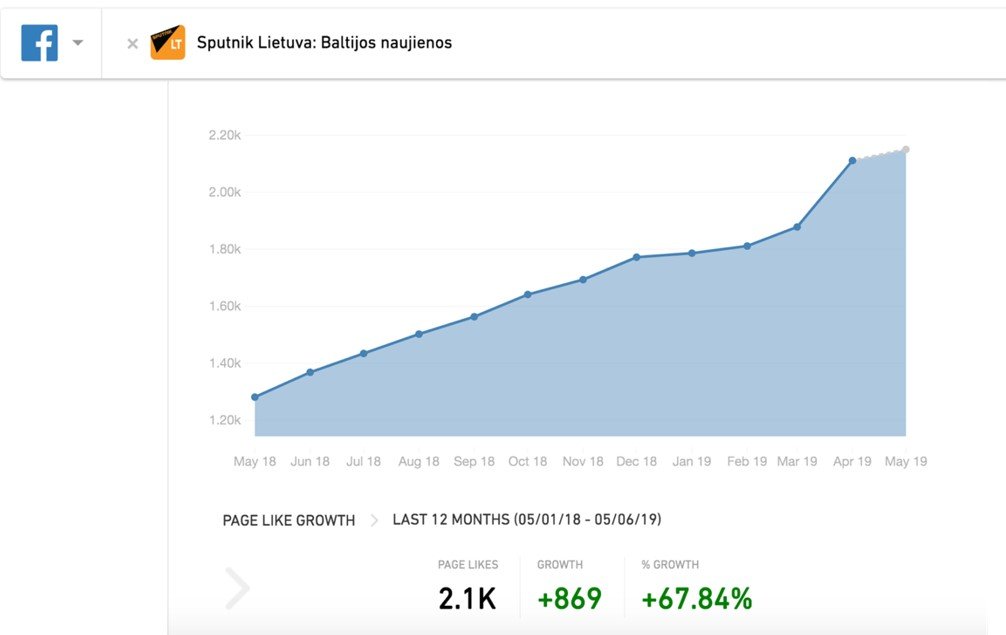
Sputnik News has become a synonym to propaganda in many countries around the world, yet especially in the Baltic States and Poland. As the Sputnik websites are often disregarded as a propagandist and are generally unpopular in the Baltic States, their activity on Facebook is gradually increasing.
These trends are not visible without the use of social media listening tools, yet with the help of this software, the growth can be clearly seen in graphs. This case study shows the growing extent of Sputnik’s influence in the Baltic countries and Poland, which Sputnik is trying to increase through their Facebook groups rather than the media outlets.
These Sputnik Facebook groups might appear harmless from the first glance, as a lot of online media outlets, such as the Lithuanian Delfi, or the British BBC News have similar Facebook groups for promoting their own content. Yet these Sputnik Facebook groups are another channel to spread the Kremlin disinformation, as the articles that were already published on their media outlets appear on the followers’ newsfeeds.
In this case, Sputnik Facebook groups are very similar in between themselves, most of them seem to be official groups and use the official Sputnik News logos, but are connected to their initial media outlets i.e. Sputnik News Lietuva Facebook group would post articles from the SputnikNews.lt webpage. Interestingly enough, the investigation by open-source analysis methods reveals an increase in their activity. Despite the low levels of engagements of Sputnik’s articles in these countries, Facebook groups, and the rapid growth of these groups is increasingly worrying.
Methodology
The DFRLab in its research uses a variety of open-source media listening tools in order to effectively analyze disinformation messages. Social media listening tools, originally created for marketing purposes to investigate the most successful advertisement campaigns, turned out to be a useful software for measuring the impact of propaganda messages.
In this research, CrowdTangle was used, which has the function of Facebook intelligence allowing to track the popularity of public groups on the platform. In this research, this function was used to investigate the popularity of Sputnik Facebook groups in Estonia, Latvia, Lithuania and Poland over the period of May 1, 2018 – May 6, 2019. All of the pages in both the local and Russian language were analyzed and the growth of the followers was used as the main criteria to judge their popularity. All of the findings are listed below.
Estonia
The Estonian Facebook page in the local language on May 6 had already ˜2300 followers. In one year the number of followers rose by 216, which is 10,54% from the ˜2050 followers at the beginning of the period on May 1, 2018.

Facebook page growth data of Sputnik Eesti Facebook page (May 1, 2018 – May 6, 2019). (Source:Crowdtangle/@DFRLab)
Meanwhile, the Estonian Russian language page was significantly more popular and experienced more increased growth. The page had less than 9000 followers at the beginning of the monitoring period and on May 6, 2019, it already had 11500 followers, averaging to the growth of 29,35%.

Facebook page growth data of Sputnik Эстония Facebook page (May 1, 2018 – May 6, 2019). (Source:Crowdtangle/@DFRLab)
Latvia
The Latvian Sputnik page was the only one witnessing negative growth. The page lost only 0,86% of followers, which was only ten followers in total. The group itself was relatively small and balances around 1200 followers.

Facebook page growth data of Sputnik Latvia Facebook page (May 1, 2018 – May 6, 2019). (Source:Crowdtangle/@DFRLab)
Meanwhile, the Latvian Sputnik page in the Russian language experienced gradual growth adding up to 13,68% over the year. The group started with less than 10000 followers and ballooned up to ˜11200 followers at the end of the year.

Facebook page growth data of Sputnik Латвия Facebook page (May 1, 2018 – May 6, 2019). (Source:Crowdtangle/@DFRLab)
Lithuania
In the case of Lithuania, the Sputnik page in Lithuanian language experienced a large growth of 67,84%. In the monitored period, the group grew from ˜1300 to ˜2100 followers, with a total growth of 869 followers.

Facebook page growth data of Sputnik Lietuva Facebook page (May 1, 2018 – May 6, 2019). (Source:Crowdtangle/@DFRLab)
The Russian version of the Lithuanian Sputnik experienced a slightly lower growth of 48,64%. Yet, comparatively, the group had a larger basis of followers that the Lithuanian language page. The monitoring period started with a little less than 3000 followers and ended with approximately 4400 followers.

Facebook page growth data of Sputnik Литва Facebook page (May 1, 2018 – May 6, 2019). (Source:Crowdtangle/@DFRLab)
Poland
Lastly, the Poland case was slightly different from the Baltic States’ case. Poland did not have an official Sputnik page in the Russian language, and the one in the Polish language was only created as early as January 2019. The Facebook group itself was very small and only had 704 followers. Due to its recent creation, it is hard to predict the future growth of the group and also whether or not the Russian language version will be created.

Facebook page growth data of Sputnik Polska Official Facebook page (May 1, 2018 – May 6, 2019). (Source:Crowdtangle/@DFRLab)
Nonetheless, the Polish case also showed an interesting feature that the Baltic States did not have. A fake Sputnik account in the Polish language was created as early as September 2018 and witnessed sharp growth of 125,25% which resulted in 8400 followers. This group not only had the largest growth of all the analyzed Facebook pages but also the largest foundation of followers totalling in ˜15100 followers at the end of the monitoring period.

Facebook page growth data of sputnikpolski Facebook page (May 1, 2018 – May 6, 2019). (Source:Crowdtangle/@DFRLab)
Conclusion
In all of the countries, the Russian language groups were far more popular than then ones in the local language. Out of which, Estonian and Latvian pages had the most followers. Most of the pages experienced growth varying from 10,54% to 67,84%.
Poland was the only country without a Russian version of the Sputnik page and also the only one with a fake trolling group that appeared to be the most popular out of all analyzed groups.
Poland and Lithuania had significantly smaller numbers of followers on the Sputnik Facebook groups than Latvia and Estonia. This observation might correlate with significantly larger Russian minorities living in the latter countries.
Furthermore, the fact that the readership of the Sputnik outlets in the Baltic States is low, this might be the new strategy on how to spread the propaganda messages. Knowing that the readership of Sputnik’s articles is relatively low in the Baltics, the promotion of Sputnik’s biased information on Facebook is likely to have better results.
Sputnik News does not have enough advertisement revenues and is fully dependent on Kremlin dotation, focusing all of its attention into the spread of preferred information messages. The casual appearance of the Sputnik article titles on the followers’ news feed might be more effectively accepted by the readers than the actual long articles on the Sputnik news websites.
These short posts are delivered straight to the followers’ newsfeed, and as the studies have suggested, short titles in the posts are enough to transfer their messages. The opening of a link to a long Sputnik article becomes unnecessary, as the readers can form the same opinions just by scrolling through the titles of the articles in Sputnik posts. And this case study indicates that more and more Facebook users in the Baltics are receiving these Sputnik News posts on their news feed.
Lukas Andriukaitis is Associate Analyst at Vilnius Institute for Policy Analysis and a Digital Forensic Research Associate at Atlantic Council’s Digital Forensic Research Lab.

Be the first to comment